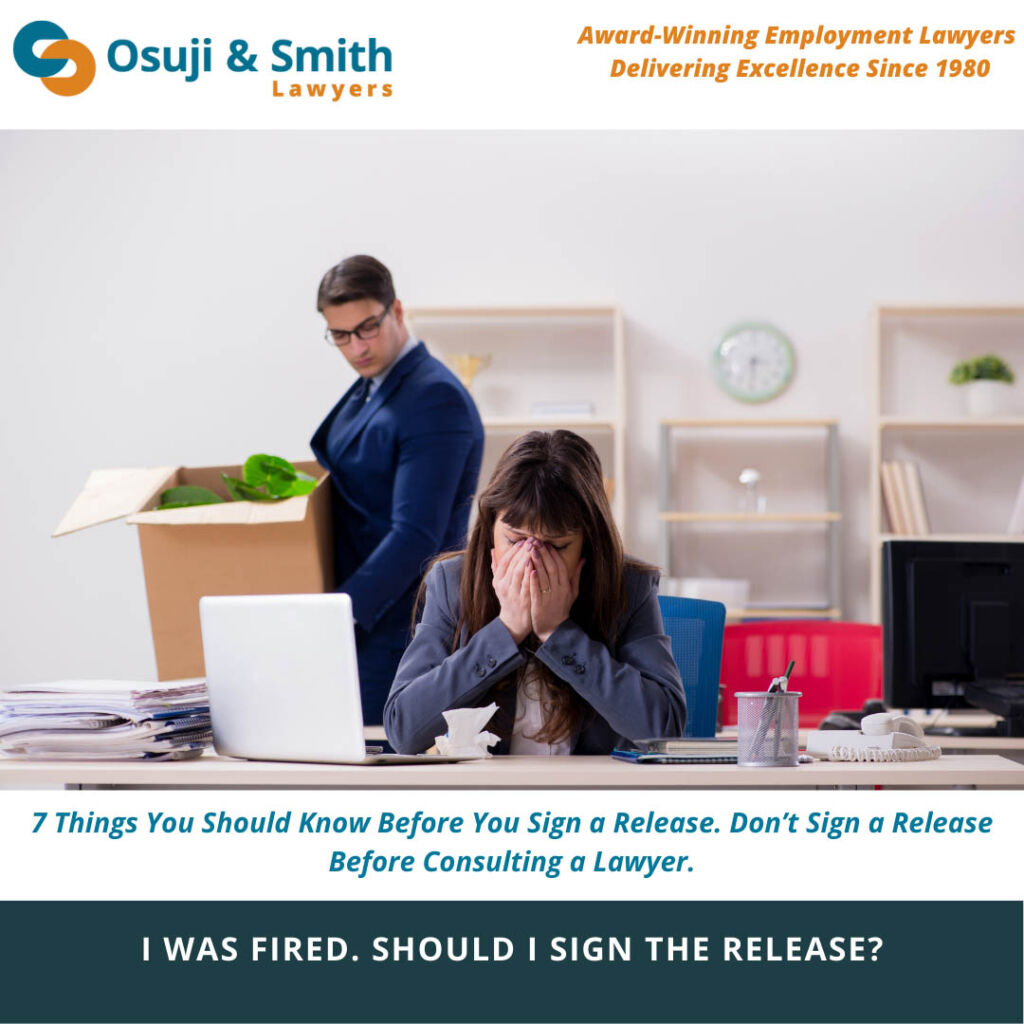I was fired. Should I sign the release?
It’s common for an employer to ask you to sign a release upon termination of your employment. Getting fired is typically an unpleasant experience that brings up a lot of emotion, and in the moment, you might be tempted to sign the release immediately, if only to minimize the tension. Resist that urge and do not sign an employment release yet. There are a few things you should know first.
What is an employment release?
An employment release is a contract between you and your former employer. Its intent is to protect the employer from legal liability concerning your employment or termination. By signing it, you give up your right to make any future claims against the employer relating to your employment or termination.
7 Things You Should Know Before You Sign a Release
Never sign any legal document unless you fully understand what you’re agreeing to. An employment release sometimes includes hidden clauses that can have far-reaching consequences on your actions even after you’ve been fired. Here are 7 important things you need to know before you sign a release.
1. You are not required to sign a release
Even if you don’t sign the release, you have a right to termination pay under the Alberta Employment Standards Code. You are not required to sign a release to receive the minimum termination pay you are due. If your employment contract states that you will receive more than the minimum requirements, signing a release should not be required unless it’s specified in the contract.
If your employer is pressuring you to sign a release, or if they are withholding your termination pay or any other contractual entitlements, consult an employment lawyer.
2. Signing a release waives your rights
When you sign an employment release, you give up your right to make any future claims against your employer. Before signing a release, consider whether you may have any potential legal claims. For example, were you wrongfully dismissed?
3. You must receive something in exchange for signing a release
What are you getting in return for signing the release? If your employer is only offering you the minimum entitlements, that’s not good enough because you have a legal right to that even if you don’t sign the release. You must receive more than the minimum legal entitlements or whatever is already promised in your employment contract, such as an increased notice period, a reference letter, or a lump sum payment.
4. You should fully understand the release
Employment releases are often written by lawyers who use hard-to-understand terminology. If there’s anything in the agreement that you don’t fully understand, do not sign it! If there’s anything you’re not comfortable with, consult with an employment lawyer.
5. You can get more information
If there’s something in the employment release that you don’t understand, you can get more information. You should never sign a contract under pressure, and you have a right to consult with your own employment lawyer so you can be sure you’re comfortable with what you’re agreeing to by signing the release.
6. A release can be negotiated
You can negotiate the terms of an employment release. If you’re uncomfortable with any of the terms, you or your lawyer can request changes.
7. You may not be able to sue your former employer if you signed a release
You should never rush into signing an employment release. However, if you have signed a release, in certain rare and exceptional situations, it may still be possible for you to sue your former employer. This is a complex area of law, so if this is your situation, consult with an experienced employment lawyer.
Don’t Sign a Release Before Consulting a Lawyer
There are many reasons not to sign an employment release before consulting a lawyer.
- Major life change: Losing your job is a major life change, and common advice suggests you “sleep on it” before making any final decisions.
- Legally irrelevant deadlines: Most release-signing deadlines are legally irrelevant. You have a right to request a few days to consult with a lawyer before signing.
- Entitled to more: You may be entitled to more than the bare minimum, but you may have to ask for it. Find out what you’re really entitled to.
- Mistakes happen: Even the most well-meaning employer can forget protocol, or make a clerical error or a miscalculation. Take your time, enlist an extra set of eyes, and carefully review the release.
- Best interests: An employment release is usually created to protect the employer’s best interests. Protect your own interests by reviewing the release with a lawyer before signing.
- It’s final: A signed release makes it nearly impossible for you to take legal action against your employer regarding your employment.
- Regret: If you sign a release and realize later that you were treated unfairly, you’ll experience deep regret. Having an employment lawyer review the release first can give you assurance that you did everything you could to ensure the best possible outcome.
The bottom line? Don’t sign an employment release before consulting an experienced employment lawyer.
An Employment Lawyer Can Advise You on Your Employment Release
If you were fired and asked to sign a release, you have a right to consult with an employment lawyer first. Take full advantage of that right.
The employment lawyers at Osuji & Smith are experienced and able to review your release and your employment contract, and advise you of your rights, what you can expect going forward, and recommended next steps. We also provide legal representation in contract negotiations, wrongful dismissal cases, and other legal employment disputes. Contact us today.


